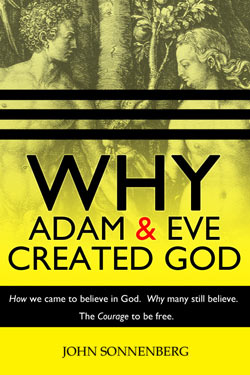Introduction to Why Adam and Eve Created God
Why do you believe in God? The question perplexes most of mankind, yet is so simple to answer. To see the answer, we must just step back and look at our world. If we ask a thousand people that question, we get a thousand different answers. But when we look at the distribution of people holding various beliefs, the answer jumps out at us. 95% of people born in Ecuador are Catholic, 97% of people born in Finland are Lutheran, 97% of people born in Greece are Greek Orthodox, 99% of people born in Tunisia are Moslem, 93% of people born in Iran are Shi’a Moslem, and 83% of people born in Israel are Jewish. Therein lies the answer! If you live in Ecuador, you would probably be Catholic. Why? Your parents, their friends, and the society all hold Catholic beliefs, and this is what you grew up with. Being Catholic seems totally natural, and you probably wonder why all people aren’t Catholic. Further reinforcing your convictions are the emotions and psychological reactions you feel when considering other religions, or doubting your own. Denying your faith would mean denying your parents, friends, and even denying your country.
By looking at how religiously homogenous most nations are, we see a universal trend—children follow their parent’s beliefs. People are whatever religion their parents made them to be. Religious traditions, ethnic background, and family legacies are intertwined to form the rope of heritage that ties one generation to its past. Prior to very recent times, people generally lived out their lives within a small territory. They had little tolerance of others who would not agree with them politically or religiously. Fear of foreign ideas, exhibited by intolerance of others, is at the root of most international conflicts and further divides people into factions. Today, as in the past, international boundaries form along religious territorial lines. The place of birth determines nationality as well as spirituality. Why do you believe in God? The answer to this question seems so simple—but there is far more to it than mere geography.

Leave a Reply
You must be logged in to post a comment.